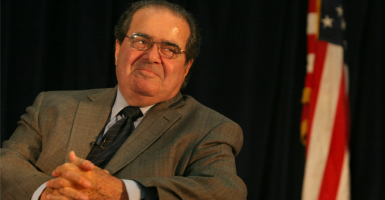On Tuesday, the Supreme Court heard oral argument in another free speech and association case, this time involving a police officer who was demoted for purportedly helping the challenger in his town’s mayoral election.
The First Amendment is supposed to protect the free speech and associational rights of individuals who work for the government. Yet, in Paterson, N.J., Jeffery Heffernan was subject to an adverse employment action because of his political speech and association.
At least that’s what the police department thought. In fact, Heffernan didn’t support either side in the mayor’s race and was not even eligible to vote in the election because he lived in another town.
After her yard sign was stolen, Heffernan’s bedridden mother asked him to pick up another sign supporting Lawrence Spagnola, the former police chief who was running for mayor of Paterson against the incumbent mayor, Jose Torres, in 2006. While he was off duty, Heffernan picked up a sign from Spagnola’s campaign staff and put it in his mother’s yard. One of the members of the current mayor’s security staff happened to see Heffernan picking up the sign at the campaign headquarters and informed Police Chief James Wittig, who supported Torres.
The next day, Heffernan was demoted from detective to patrol officer, and his supervisor told him it was because he supported Spagnola. Heffernan filed a lawsuit in federal court against the City of Paterson, Mayor Torres, and Police Chief Wittig for violating his free speech and associational rights. The district court ruled that Heffernan could not sue based on his employer’s mistaken perception of his speech, and the Third Circuit Court of Appeals agreed. Now Heffernan brings his case to the Supreme Court.
A ‘Bizarre’ Case
If Heffernan had actually been active politically, this would be an easy case, since the Supreme Court has held that the government cannot retaliate against non-patronage employees for exercising their constitutional right to speak or associate. What makes this case “bizarre,” as Justice Antonin Scalia said in his questioning during oral arguments, is that Heffernan was demoted based on his employer’s mistaken perception—the mayor and the chief of police thought Heffernan was campaigning for the mayor’s challenger when he wasn’t.
Almost all of the questioning by the justices was over the issue of whether there can be a violation of the First Amendment based on a misperception even when the individual is not actually exercising that right. Or, as Scalia said, Heffernan was demoted for the wrong reason—is there a constitutional violation if you are fired or demoted for the wrong reason?
On an extremely cold day in Washington, D.C., Mark Frost, counsel for Heffernan, argued in a sparsely filled courtroom that it cannot be the case that a public employer can punish employees for their speech, or worse, hide behind the boss’s misperception of that speech. If this is allowed, why wouldn’t the same boss be allowed to fire an employee based on a mistaken perception of an employee’s race or religion?
As Heffernan argued in a brief to the Supreme Court, the lower court’s rule “makes no practical sense. It rewards the careless, politically motivated supervisor, who has license to make knee-jerk disciplinary decisions without any factual investigation[.] … The First Amendment can hardly permit careless supervisors to punish employees where conscientious supervisors could not.”
The Views of Liberal, Conservative Justices
However, that is exactly the position taken by Tom Goldstein, the counsel defending the actions of the City of Paterson. Several of the liberal justices, including Ruth Bader Ginsburg and Elena Kagan, picked up on this theme. Ginsburg asked Goldstein whether his argument meant that an employer could fire an employee for getting pregnant (which violates federal law) if the employer made a mistake and the employee was not actually pregnant but had “just gotten fat” (which raised a laugh in the courtroom). Goldstein answered that the EEOC would think she has a claim, but it would be based on a statute, not the Constitution.
Kagan asked Goldstein whether it would be sufficient to assert a constitutional violation if the employer had an “impermissible purpose,” which echoes an article that Kagan wrote on this very topic in 1996 while she was teaching at the University of Chicago. Goldstein argued that there would be no violation under those circumstances. Justice Stephen Breyer questioned that position, saying that there is a general principle that if a bad actor makes a mistake (such as shooting the wrong guy), he is still liable for his actions. Goldstein said that while that may apply in statutory situations, it doesn’t apply in the constitutional context.
Some of the conservative justices seemed the most skeptical of the position being pushed by Heffernan. Scalia said at one point that Heffernan wasn’t associating with anyone or expressing any political view, so what prior case vindicated the petitioner’s proposition that a constitutional right had been violated? Frost pointed to prior case law, none of which is exactly on point. Justice Anthony Kennedy asked Frost some very tough questions, too, but he also seemed skeptical of the position being taken by Goldstein. At one point Kennedy asked Goldstein if he was really arguing that the Supreme Court should take the position that it is fine for the government to ascribe a position to a citizen that the citizen does not actually have.
Goldstein did his best to assuage the skeptical justices by pointing out that even if Heffernan did not have a constitutional claim, he had a possible remedy for the demotion under both the collective bargaining agreement in Paterson and a state civil rights law.
Although it is always dangerous to predict the outcome of a case based on how the oral arguments went, it would seem that Heffernan had the support of the liberal justices, and he may be able to persuade some of the other justices to vote his way, such as Justice Kennedy, who is a forceful First Amendment proponent. Scalia seemed the most skeptical of Heffernan’s position. But one never really knows how these cases will come out.






























